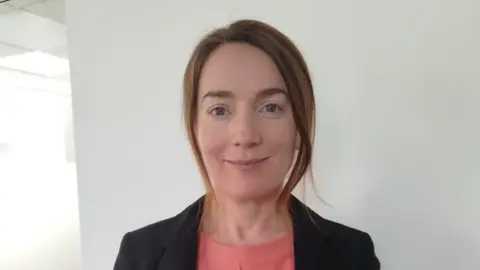Asylum accommodation costs set to quadruple in NI, says watchdog
 Getty Images
Getty ImagesThe estimated costs of accommodation for asylum seekers in Northern Ireland has risen to £400m, four times the original estimate.
That is according to a report by the UK Spending watchdog, the National Audit Office (NAO).
The NAO has examined the Home Office's asylum accommodation contracts across the UK.
In 2019, the Conservative government signed seven regional contracts with three private companies - Serco, Mears and Clearsprings - to help house asylum seekers.
In Northern Ireland, asylum accommodation is provided by Mears.
The UK has a legal commitment to support people seeking asylum, while it makes a decision on their asylum claim, by providing financial support and accommodation.
The NAO has looked at the amount the government has spent and is likely to spend on accommodation for asylum seekers in the decade from 2019 - 2029.
The Home Office originally estimated that the total cost of the contract in Northern Ireland for 2019-2029 would be £100m.
But according to the NAO, the Home Office's latest estimate for the cost in Northern Ireland from 2019-2029 is £400m.
In 2024-25 alone, the cost to the Home Office of asylum accommodation in Northern Ireland was £55m.
'System in chaos'
A Home Office spokesperson told BBC News NI the Labour government has "inherited an asylum system in chaos" with tens of thousands of people stuck in backlog, unprocessed claims and "disastrous contracts that were wasting millions in taxpayer money".
"We've taken immediate action to fix it – increasing asylum decision making by 52% and removing 24,000 people with no right to be here, meaning there are now fewer asylum hotels open than since the election," they added.
By "restoring grip on the system" with speedier decision making, the Home Office said it hopes to end of use of hotels and are forecast "to save the taxpayer £4 billion by the end of 2026".
On Monday, Prime Minister Sir Keir Starmer outlined his government's plans to "tighten up" the immigration system, promising these will cause migration numbers to fall significantly.
People can be housed in hotels or "dispersed accommodation" (DA) like houses or flats while they wait for the government to make a decision on their claims for asylum.
The NAO report, which was commissioned by Parliament's Home Affairs Select Committee, says the number of asylum seekers in paid-for accommodation increased from around 47,000 in December 2019 to 110,000 in December 2024.
According to the NAO, there were 2,741 people in asylum accommodation in Northern Ireland in December 2024.
That included 413 people in hotels and 2,328 people in other accommodation.
Northern Ireland has the lowest number of people in asylum accommodation of the seven regions of the UK where the Home Office has regional contracts.
But according to the NAO, asylum accommodation in Northern Ireland is among the most profitable in the UK, with a profit margin of 15% for the supplier.
The NAO says that in total the three companies made a combined profit of £383m on asylum accommodation contracts between September 2019 and August 2024.
The Labour government has recently said that visa applications from nationalities thought most likely to overstay and claim asylum in the UK could be restricted.
Money 'paid to private companies'
 Liz Griffith
Liz GriffithLiz Griffith, from the Migration Justice Project at Law Centre NI, said that, while the cost of supporting asylum seekers is "expensive", the cost is a "political choice".
"It's not good public policy to prevent people from working," she added.
Ms Griffith said the government should offer more of the visas that are available to those fleeing Ukraine, where the current rules mean they can apply for visas which allow them to work in the United Kingdom.
Successful applicants are able to live, work and study in the UK and access public funds.
Usually, those who claim asylum in the UK are not allowed to work whilst their claim is being considered.
"If the government wants to save money, it should grant asylum seekers the right to work, as research shows that this would save the government £4.4bn."
'Restore dignity amongst those waiting'
She said such a law change would mean that asylum seekers would also be able to make a contribution to the national Gross Domestic Product (GDP).
"Most importantly, it would restore dignity amongst those people currently waiting for a decision," she added.
Ms Griffith said that Westminster, rather than Stormont, pays for this support, and that people seeking Asylum have the right to do so under International Human Rights law.
She said the government could "speed up and improve decision-making processes".
"A further way to save money is to stop accommodating people in expensive hotels," she said, adding that there should be alternative accommodation.
She said that because "a lot of the money for asylum support is paid from the Home Office to private companies," it was a "profitable business".
What do the terms asylum seekers and refugees mean?
A refugee is a person who has been forced to leave their country in order to escape war, persecution, or natural disaster.
Refugees have a right to international protection.
This person could be a combination of all of the above, although they are asking for international protection in another country.
A person needs to apply for asylum if they want to stay in the UK as a refugee.
